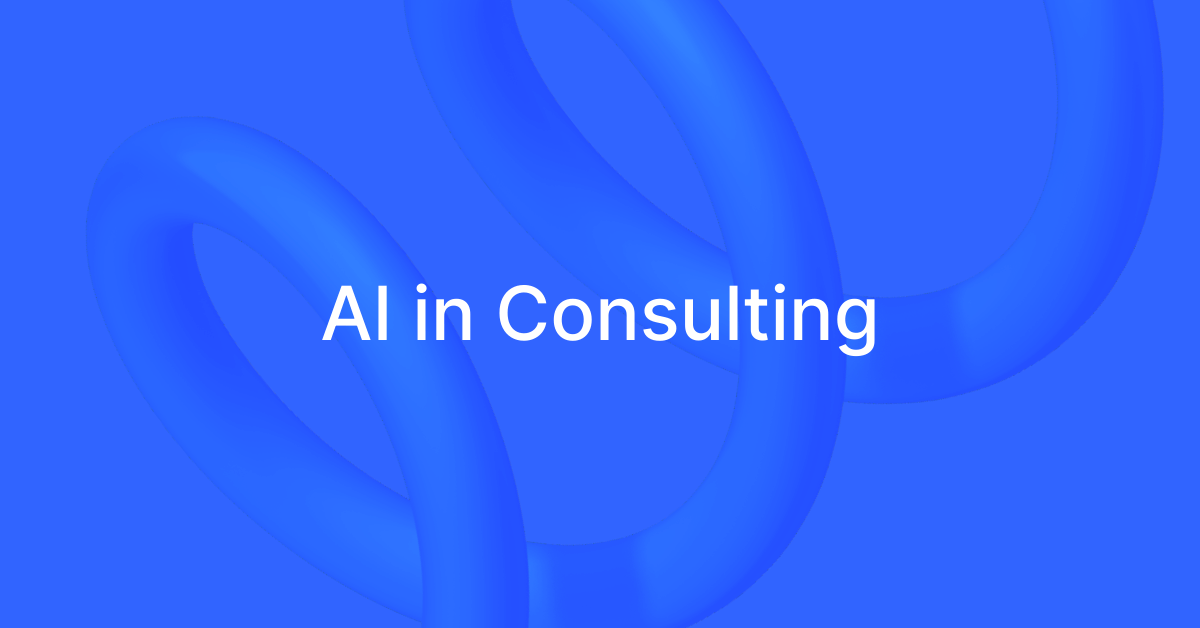
AI in Consulting: Impact, Risks & Future Trends
Record, transcribe and summarize conversations with one click.
The potential impacts of AI in consulting are vast. Their use extends from automating repetitive tasks to data exploration, analysis, and visualization, among other benefits.
This presents consulting firms with equal opportunity and risk. Embrace generative AI to achieve operational excellence, or risk losing ground to AI as more people seek cheaper and more efficient solutions.
Join me as we examine AI's impact on consulting. We will assess the potential risks of using AI and help you identify the best tools to get started.
How AI is reshaping the consulting industry
In 2022, the value of AI was around $93472.06 million, and more than half of the big enterprises were already using AI consulting services. This market has grown to a staggering $638.23 billion, with projections to reach $3680.47 billion by 2034.
New models such as generative AI execute tasks like data analysis and strategy development more efficiently and quickly than traditional consultants.
They reinforce the idea that AI consultants are not a passing trend but a stepping stone of what to expect in the future.
Although AI's technical capabilities may benefit businesses, potential clients are now questioning the need to hire human consultants. This presents a need to re-examine AI's impact on the future of consulting.
Will AI replace consultants?
AI may not fully replace human consultants. However, it may disrupt the consulting industry in the long term by eliminating consultants who are slow in its adoption and implementation. Here is why:
AI excels at analytical and linear thinking on scales unprecedented by even the best consultants. Provide it with a large amount of data; it will analyze it in seconds and generate tailored feedback.
Interestingly, a new study also indicates that AI has become smarter and more creative than humans in divergent thinking, meaning creativity is no longer a concern.
Does this mean AI is now smart enough to replace all consultants fully? Well, not exactly.
While AI is getting more intelligent and more effective by the day, it's not yet at a level where it can factor in cultural influences and unpredictable emotions that often play a role in strategy creation and implementation success. Human consultants will still be necessary until AI can understand and predict human emotions and behavior.
Until then, only high-quality consultants will continue to prevail: those who leverage the use of AI instead of viewing it as competition.
Generative AI presents several opportunities to consultants:
It can analyze large amounts of data and extract valuable insights.
It can automate all your repetitive routine tasks.
It can help you identify trends with greater accuracy and at a reduced risk of human error.
It can improve your firm's overall productivity while lowering costs.
Aside from these general advantages, using generative AI in consulting also presents opportunities to provide specialized services to businesses.
For example, consumer trust is an emerging issue as more businesses implement AI. You can help companies continuously monitor and audit AI systems to identify and prevent AI biases and address any emerging ethical issues. After all, big firms like Boston Consulting Group, McKinsey and IBM are doing this to rack up hundreds of millions in sales.
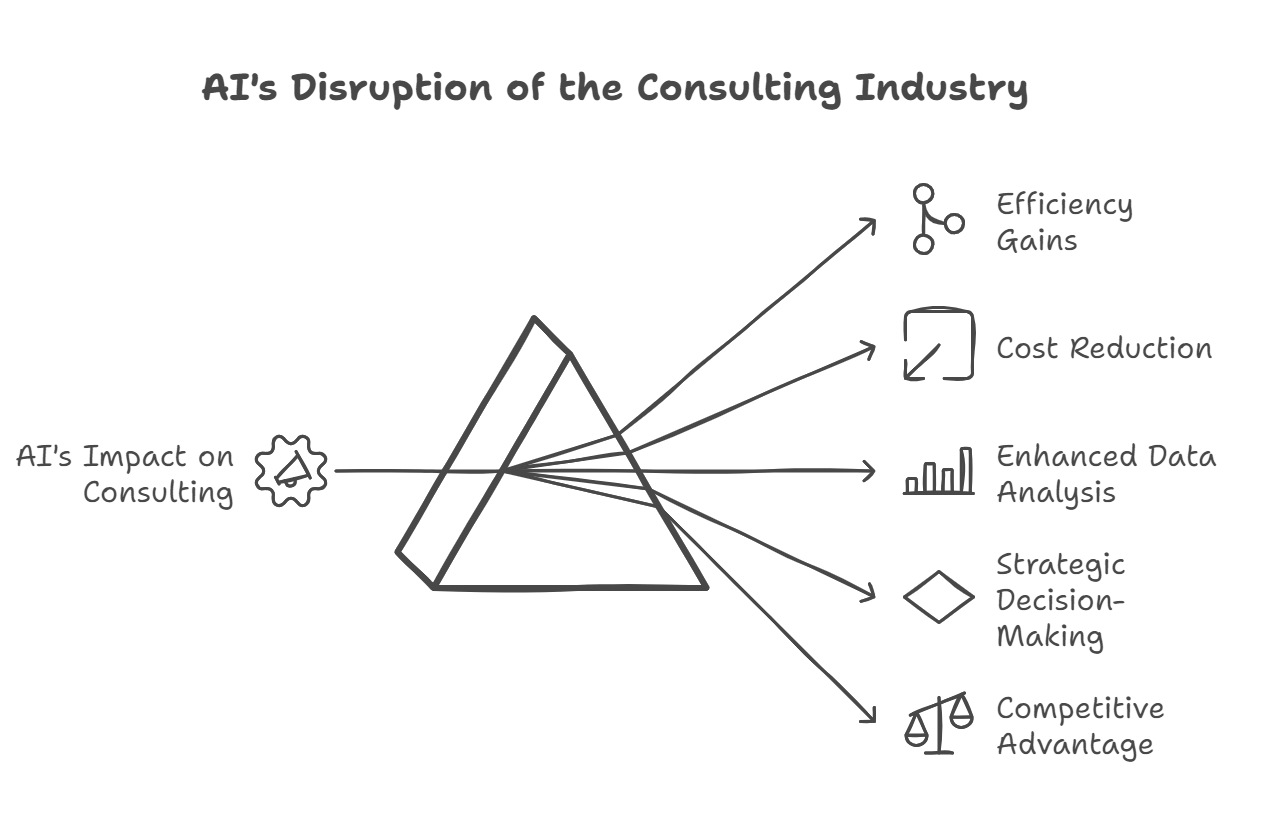
The top consulting firms are making significant strides in adopting generative AI. For example, PwC is already using generative AI in 950 out of 1000 US clients. It has also become the biggest OpenAI enterprise customer after purchasing ChatGPT enterprise slots for 100,000 employees.
Although big consultancy firms are leading the race in implementing AI, small firms can still keep up and level the playing field by offering similar high-quality work at a lower price.
According to an IBM report, 78% of consulting buyers are now seeking more value at low costs.
Important considerations for using AI in consulting
While AI creates opportunities in the consulting industry, it also has limitations and risks you must consider before starting. These include;
An overwhelming learning curve
Implementing generative AI into your consulting tech stack is not as simple as clicking a button and making it work. It requires a strategic and patient approach.
First, you need to identify and select the best tool to use. To do this, define your goals. What do you plan to achieve? If it is automation or data analysis, you can find specific tools for that.
Next, find out how the AI works, what data it needs, and how to train and customize it to meet your needs. Naturally, if you are technically skilled, this may not be an issue for you.
However, if you or your team are new to AI, invest time in training your staff on how to include AI in your workflow and developing resources your team can use as references or training material for new recruits.
Responsibility and liability
Who is liable when the AI system you are using fails to perform? If you use AI to generate a strategic firm expansion plan for a client, and it fails, who should take responsibility for the failure?
Accountability should never be seen as an afterthought, especially if your AI systems contribute to your client's business's strategic decision-making. When used with care, AI can achieve the unthinkable. However, poor implementation can lead to disastrous results that may land you in court.
Due to AI's complex nature, tracing the source of the error leading to failure may be challenging. It's even more complicated if it arises from the carelessness of different stakeholders.
For example, if a developer makes a coding error and a client provides incorrect data, it may be difficult to determine who is liable if a problem occurs.
Increased client expectations
As more consultants use AI to enhance their impact, clients will demand increased speed, accuracy, reliability, and client personalization.
Already, data shows that 80% of consulting buyers want to work with companies using AI to get better outcomes at a better cost. While the rise in demand is good, it can pressure firms to over-promise only to under-deliver, leading to client dissatisfaction.
Moreover, some firms may end up prioritizing AI output over human input. This overdependence can make you lose sight of the nuanced understanding of business you can only get from experience.
To avoid this problem, implement AI only as a tool to augment your capabilities, not as a replacement for your work. Also, invest in training to understand how it works effectively.
Before rolling it out to clients, test the AI tool on a small scale. The feedback you get will help you refine your processes to improve your outcomes and meet client expectations.
4 useful AI tools for consulting
Like any tech, AI is not a silver bullet. It will not solve all your problems for you. Before investing in any AI tool, ask yourself, 'What does our firm want to achieve?' and find the best tech to achieve this.
Here are four useful AI tools for consulting firms that should get you started.
Notta - AI to make your meetings productive
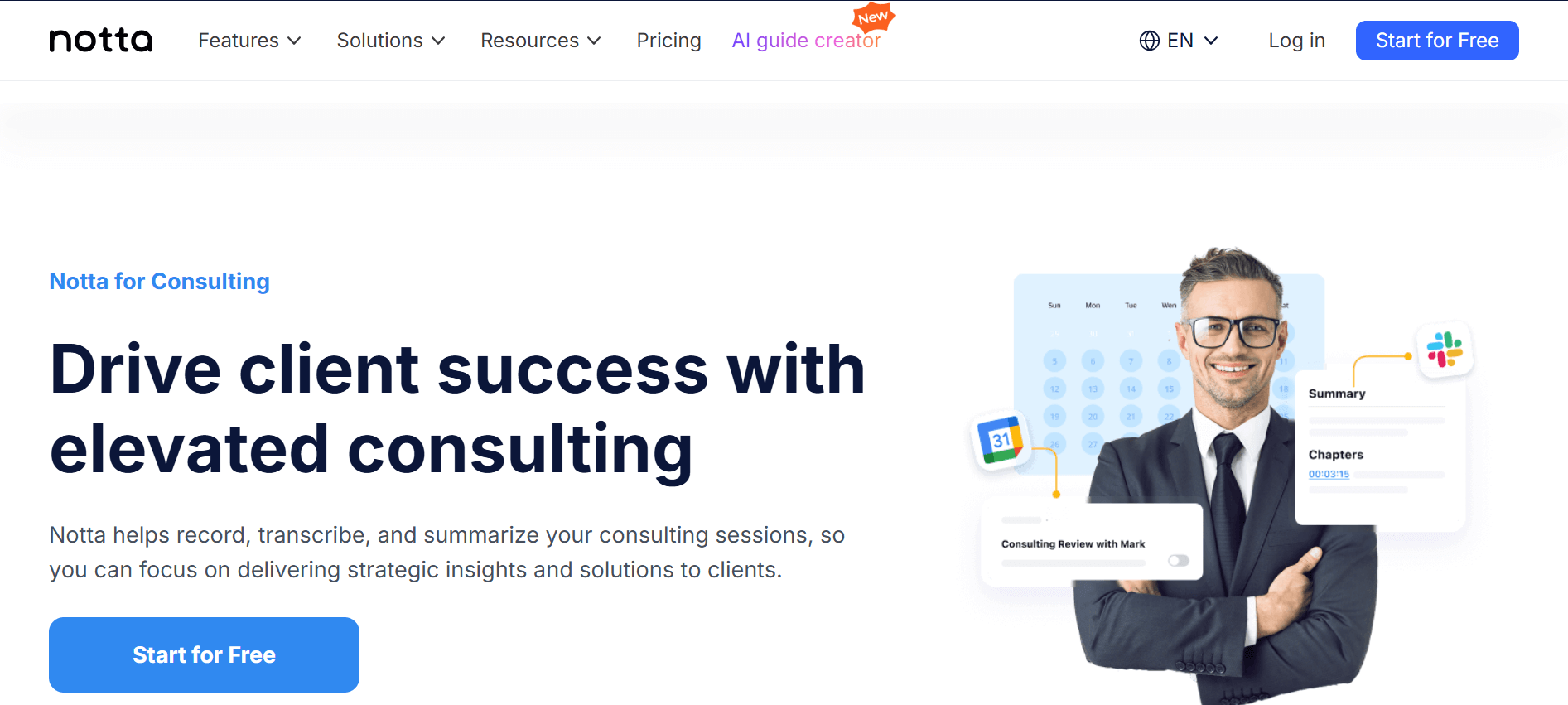
Notta is a meeting assistant that can record, transcribe, and generate accurate summaries for all your meetings. You can use it in all your in-person and online meetings to beef up productivity and be fully present and active without worrying about note-taking.
The AI can generate a structured summary of your discussions with a section for chapters and an overview of your meeting, making it easy to grasp the main points.
It also highlights all your action items in bullet points for quick follow-up. With Notta, you can spend less time sifting through meeting minutes and more time attending to your clients' strategic concerns.
Notta's ability to integrate with tools like Slack, HubSpot, Zapier, Notion, Google Drive, Salesflare, and Pipedrive allows you to share meeting summaries or transcripts with your stakeholders.
Notta offers the most integrated AI meeting notes, summaries, and action items so nothing gets missed.
Zapier - AI to automate repetitive tasks
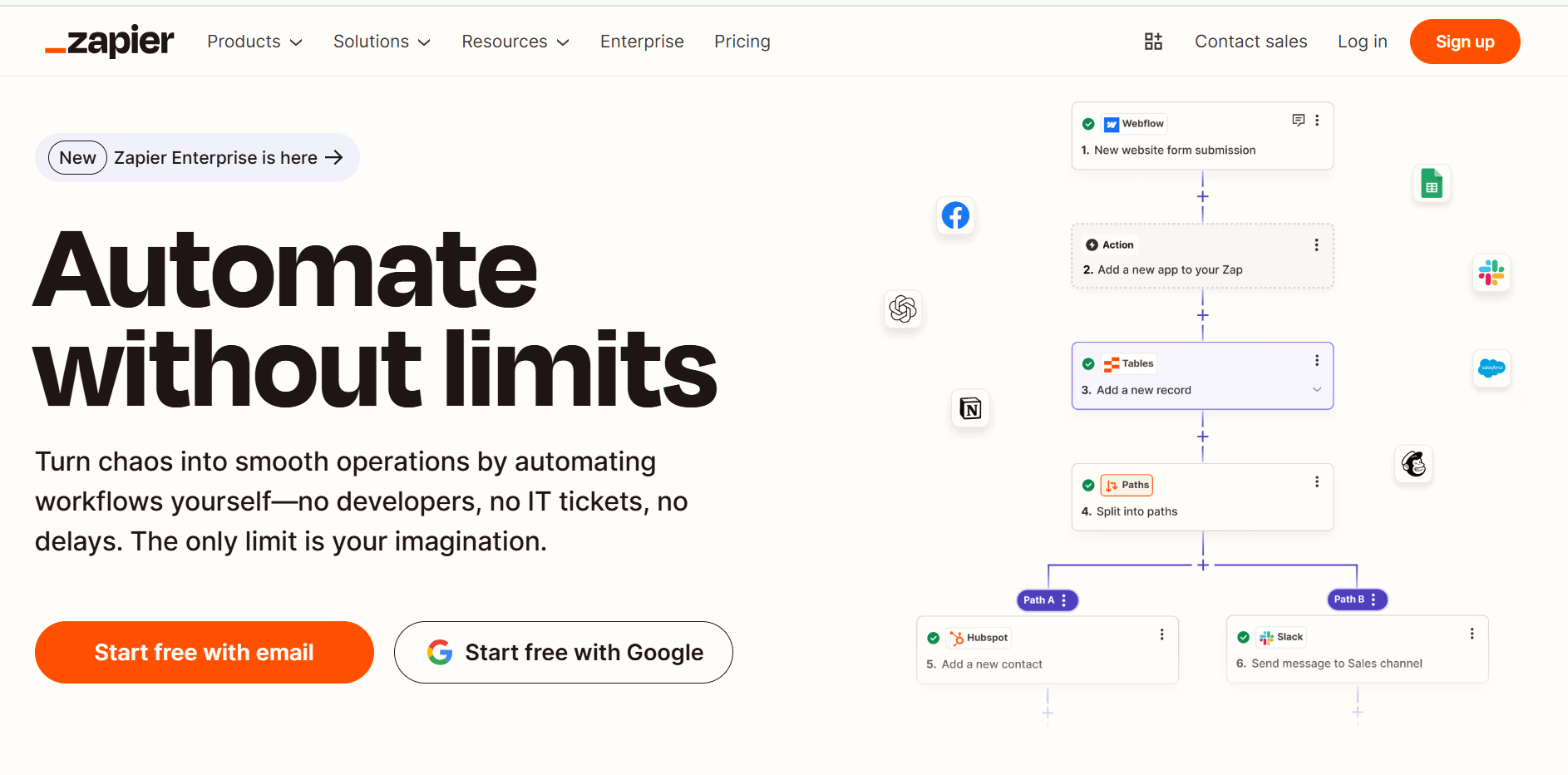
Zapier is an AI tool that automates repetitive everyday tasks to make work more efficient and productive.
It does this by streamlining data transfer between apps you frequently use through automated workflows called 'Zaps.' The AI can connect over 7000 web apps, all from the Zaper platform.
Every 'Zap' consists of a 'Trigger' (what starts the automation process) and an 'Action' (an executable task). For example, you can set up a workflow that collects your meeting summary notes from Notta (Trigger) and automatically sends them to you by email (Action).
You don't need any coding skills to use Zapier. What's more, you can customize all your workflows to perform different tasks and handle very complex processes that require several apps. All this happens in real-time, meaning that the data you get is accurate and helpful when making strategic decisions.
GetGenerative.AI - AI to streamline your workflow
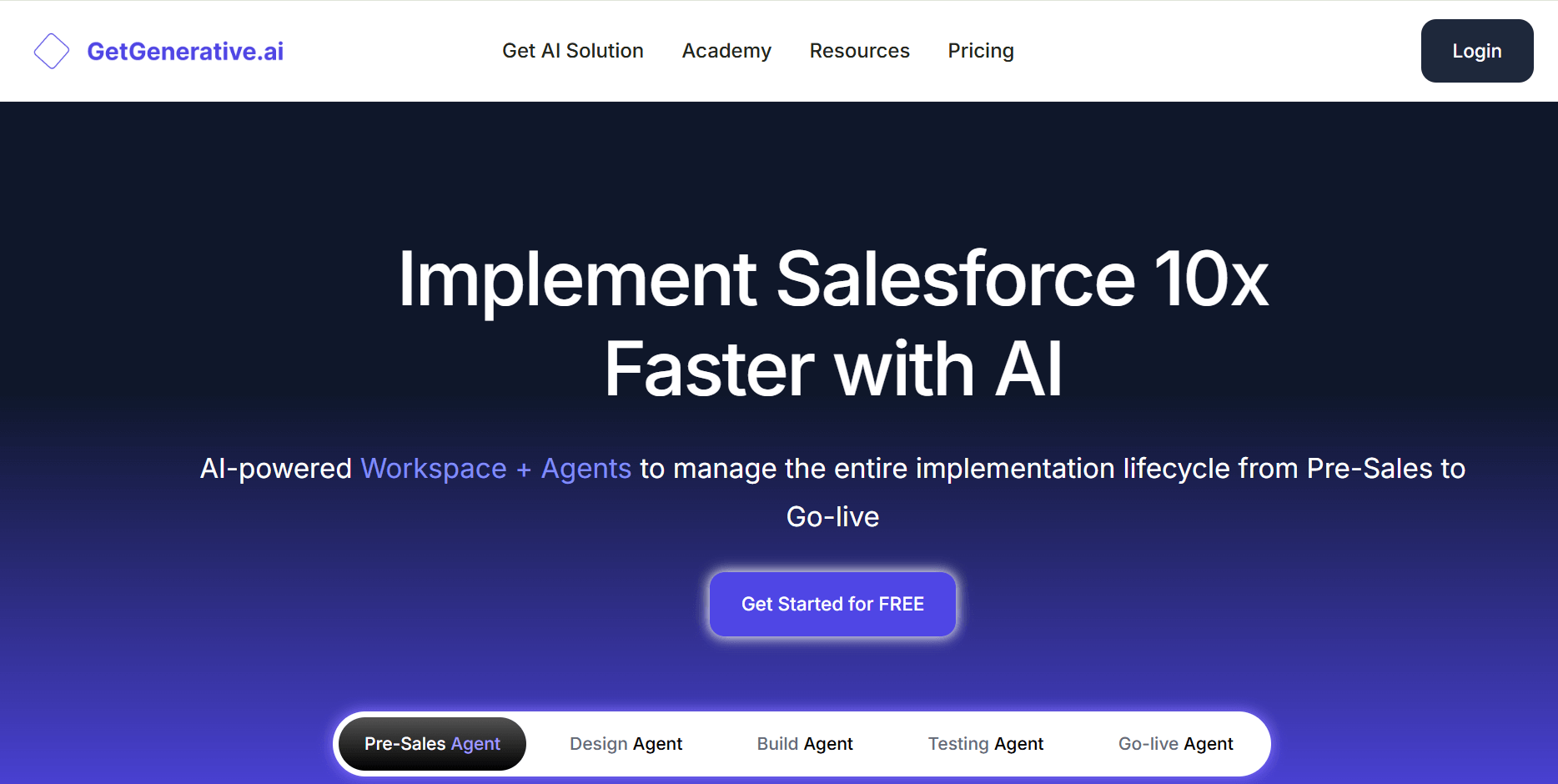
If your firm uses the Salesforce ecosystem, GetGenerative.AI is the tool you need to automate your processes. It is an AI-powered workflow management tool that claims to complement your Salesforce efforts by 10X.
The AI breaks down all your salesforce data to uncover client patterns or insights that can help you make better decisions. It comes with AI models you can train using your client's data to help generate sales forecasts and identify risks and opportunities.
Unlike similar tools, GetGenerative.ai has a feature that allows you to quickly create presentations and estimates from the platform using the data it provides. This saves you time preparing client documents, allowing you to focus more on other high-value tasks.
IBM Watson Analytics - AI for data analysis
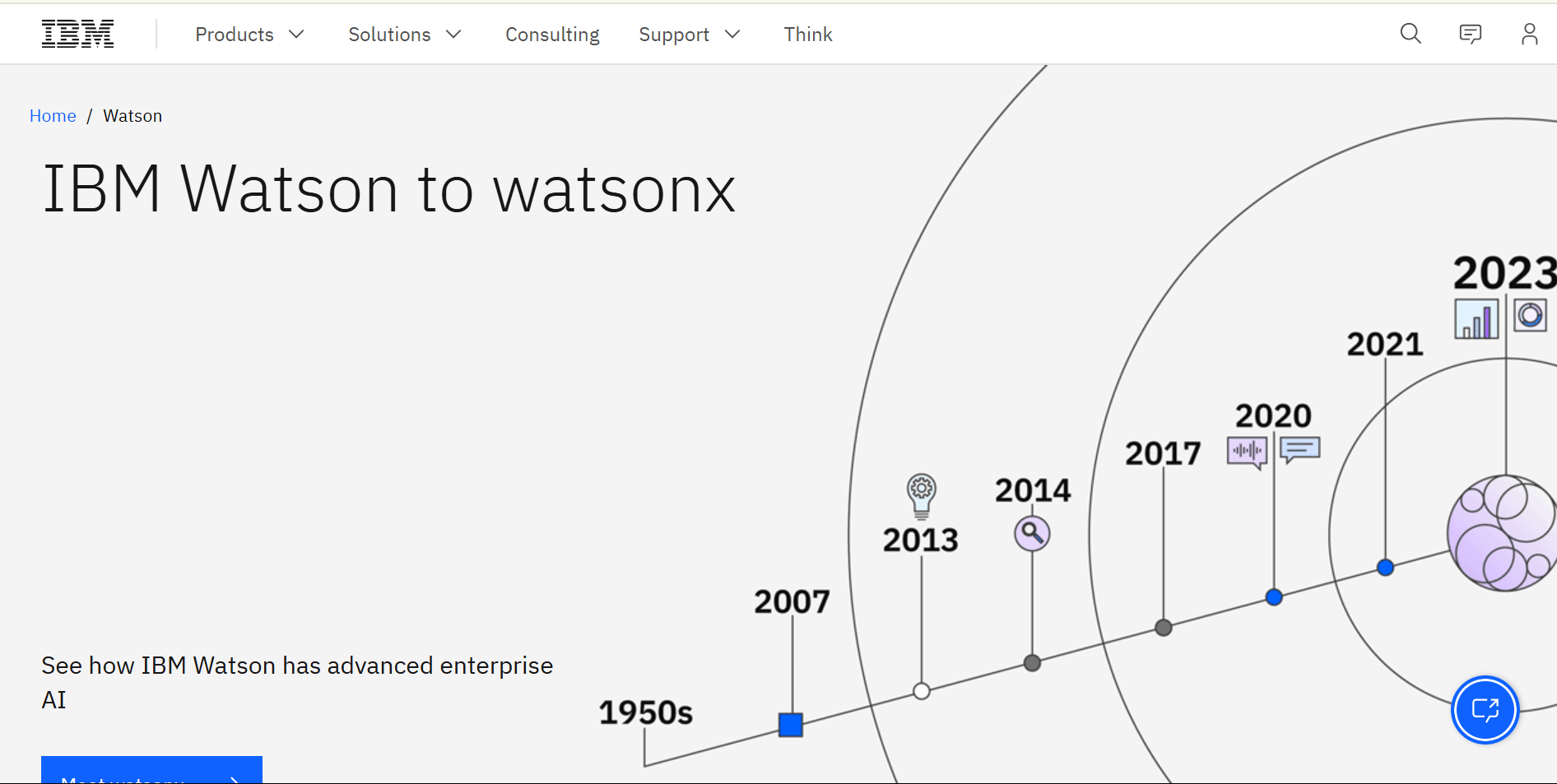
IBM Watson is a cloud-based AI tool that top organizations use for data discovery, visualization, and analysis. The AI analyzes and refines all the data you load to it, then shapes it into easily visualized formats from the app's dashboard.
Moreover, it can generate insights based on historical data that you can use to advise your clients and forecast the future. You can customize the AI's dashboard to show only the needed metrics and quickly generate reports in seconds.
IBM Watson features application-level firewalls and storage encryption to protect users from external threats. It also employs heavy encryption, giving you peace of mind that your data and that of your clients will be safe.
Future trends in AI and consulting
The future of AI in consulting is full of exciting developments we are all eagerly anticipating. You can expect to see the use of edge AI to aid businesses in increasing their operational efficiency and the implementation of quantum computing to make AI systems more powerful and efficient.
We should also expect AI to end the famous billable working hour model, where consultants charge clients according to the amount of time they work. As AI efficiency increases, more clients will expect a reduced cost of service delivery and move towards an outcome-based pricing model.
Consultants staying up-to-date with all these developments may gain a competitive edge in the market.
Don't wait to be second in the market. Start using AI today by integrating Notta into your workflow to automate documentation. This will help you focus on more critical tasks, like developing personal relationships.
Notta AI meeting assistant records, transcribes, and summarizes meetings so everyone can stay engaged without missing important details.